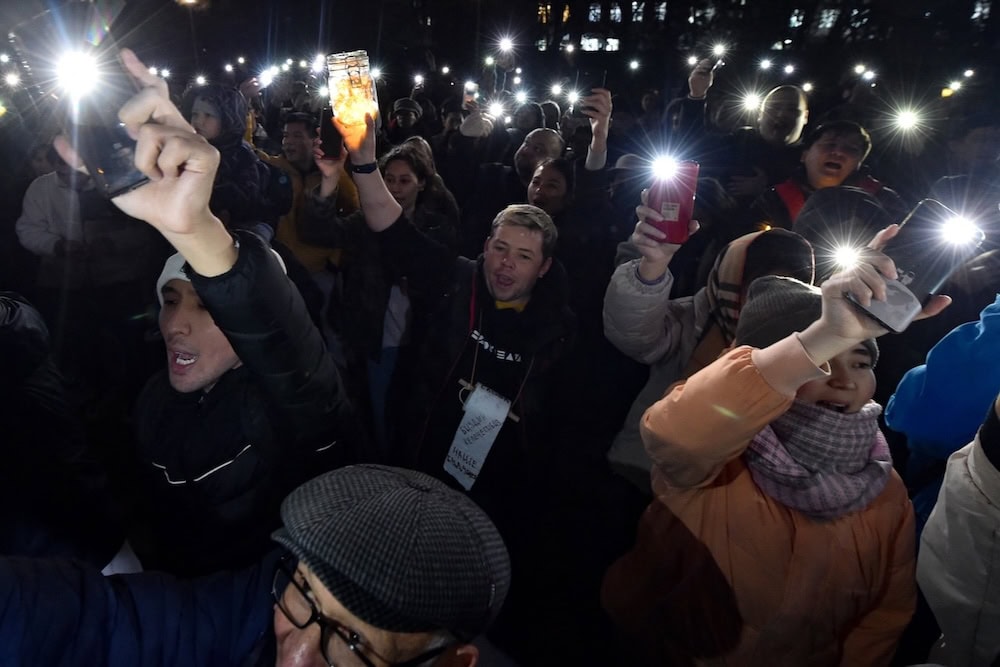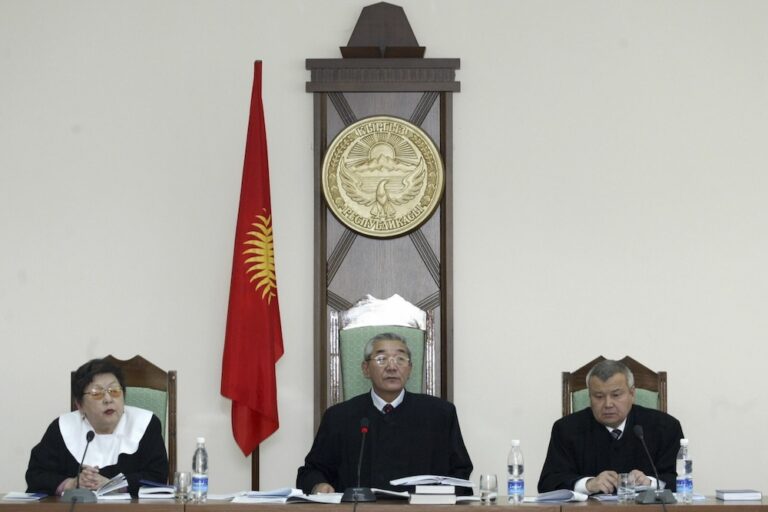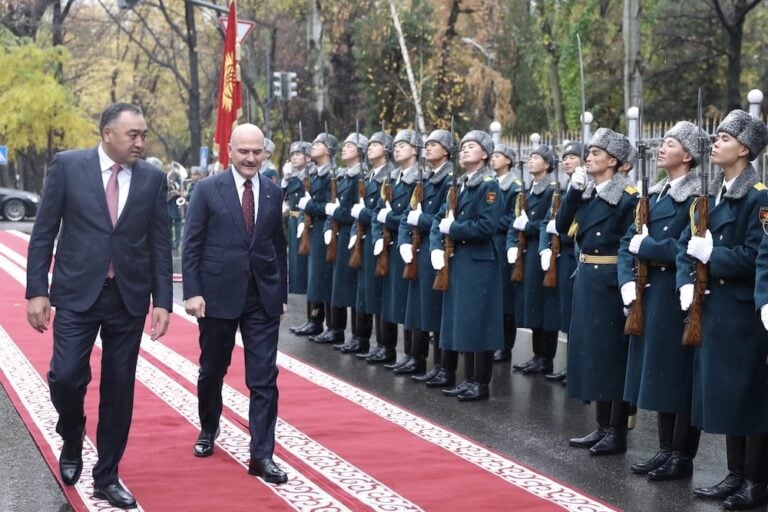"The forced closure of 'Kloop Media' not only silences a crucial voice in Kyrgyzstani society but also signals a continued decline in Kyrgyzstan's respect for civil and political rights and freedoms of its citizens."
This statement was originally published on hrw.org on 6 September 2024.
Halt media intimidation campaign, end ongoing repression of reporting
Kyrgyzstan authorities should retract their decision to liquidate the award-winning investigative outlet Kloop Media, eight international human rights groups said today.
On August 29, 2024, Kloop Media Public Foundation reported that Kyrgyzstan’s Supreme Court upheld a February liquidation order from a Bishkek district court against the publication. The decision was made in a closed hearing on July 16, but Kloop Media was only informed on August 22. The Supreme Court’s rulings are considered final and not subject to appeal.
“The forced closure of Kloop Media not only silences a crucial voice in Kyrgyzstani society but also signals a continued decline in Kyrgyzstan’s respect for civil and political rights and freedoms of its citizens,” said Hugh Williamson, Europe and Central Asia director at Human Rights Watch. “This action undermines the public’s right to information and further weakens the foundations of democratic governance in the country.”
The case against Kloop Media was initiated in August 2023 following a lawsuit by the Bishkek City Prosecutor’s Office. The lawsuit alleged that Kloop had failed to register as a mass media outlet and had engaged in media activity not listed in its charter, which can warrant the liquidation of legal entities under Kyrgyzstan’s civil law code. The lawsuit also cited a pretrial investigation into Kloop’s activities initiated by the Kyrgyz State Committee for National Security in November 2021, alleging violations of criminal code provisions against “making public calls for the violent seizure of power online.”
The lawsuit accused Kloop Media of “sharp criticism of [the] government” and listed a number of articles that it categorized as critical of the Kyrgyz government’s policies and of state and municipal bodies. The opinions of several court-affiliated legal experts cited in the lawsuit said that Kloop’s publications use “hidden manipulation,” as experts put it, leading to “dissatisfaction” and “distrust” of the authorities among its readership, which could lead to their “zombification” and to encouraging readers to join anti-government protests.
The lawsuit also spotlighted Kloop’s coverage of the situation in the country’s southern Batken region, which had been the site of two border conflicts with Tajikistan over the past three years. A Human Rights Watch report on the most recent conflict, in September 2022, found that forces from both sides committed apparent war crimes in attacks on civilians. The lawsuit alleges that Kloop’s articles about the region were responsible for the continued flow of internal and external migration away from the region, which the lawsuit claims serves Tajikistan’s strategic goals.
In September 2023, the authorities blocked Kloop’s website and on February 9, 2024, a district court in Bishkek ruled in favor of the prosecution’s request to liquidate Kloop Media on grounds of its failure to list journalistic activities as part of the foundation’s charter. Kloop tried to appeal to the Bishkek city court, which said the filing deadline had expired. The Supreme Court supported that decision, effectively exhausting Kloop Media’s legal options.
Kloop Media is known for its independent reporting on national and regional affairs. It has also collaborated on anti-corruption investigations with the Radio Free Europe/Radio Liberty’s Kyrgyz Service and the Organized Crime and Corruption Reporting Project, a global investigative journalism network.
The assault on Kloop is part of a broader pattern of media repression in Kyrgyzstan, the organizations said. In January 2024, police arrested 11 current and former journalists associated with Temirov Live, another investigative outlet, following raids on their homes. They faced criminal charges in retaliation for their reporting and are currently on trial. Four remain in pretrial detention.
In 2023, the authorities brought cases against Radio Free Europe/Radio Liberty’s Kyrgyz service, resulting in the freezing of its bank account and the blocking of its website. In addition, in January 2024, the office of the news agency 24.kg was closed for more than two months pending a spurious criminal investigation opened following a raid and the detention of media editors by the Kyrgyz national security agency.
Numerous other independent media outlets, journalists, and bloggers have also faced increasing pressure, including politically motivated criminal cases, arrests, and prosecution. The websites of various independent news sites have been arbitrarily blocked, creating a chilling effect on free expression throughout the country.
In addition, the undersigned organizations share grave concerns that the currently considered legal amendments, which include recriminalizing defamation, could lead to a new wave of violations of the right to freedom of expression. Due to the widening media crackdown and increasing violations of civic freedoms, Kyrgyzstan is currently on the CIVICUS Monitor’s global watchlist, which highlights countries facing a serious decline in civic space.
Kyrgyzstan’s actions against independent media have significant international implications. As a member of the United Nations Human Rights Council, Kyrgyzstan has a particular obligation to uphold fundamental human rights and freedoms. However, the forced closure of Kloop and the harassment of other media outlets not only violate Kyrgyzstan’s own constitutional guarantees but also breach its international human rights obligations.
“The regression in media freedoms tarnishes Kyrgyzstan’s international reputation and raises questions about its commitment to the values UN Human Rights Council members are expected to uphold,” said Brigitte Dufour, director of International Partnership for Human Rights.
Kyrgyzstan’s international partners, including the UN, the Organization for Security and Co-operation in Europe, and bilateral allies, should exert diplomatic pressure on the Kyrgyz government to reverse its repressive course against independent media. In all their interactions, they should insist that the authorities need to clearly demonstrate that Kyrgyzstan complies in practice with its international human rights commitments.
“The Kyrgyz authorities’ move to liquidate the acclaimed independent news organization Kloop Media is yet another sign that the government prefers to silence critics rather than address the issues they raise. This is an unacceptable attack on press freedom. Independent media like Kloop Media are the canary in the mine for civil and political rights; silencing them leaves no doubt about the deterioration of freedom. The Kyrgyz government must reverse its assault on Kloop Media and other critical voices,” says John Stauffer, acting executive director at Civil Rights Defenders.
“We urge the Kyrgyz government to halt its campaign of intimidation and legal persecution against journalists and media outlets, allowing Kloop and all other independent news sources to operate without interference or fear of reprisal,” said Marie Struthers, director of Amnesty International’s Eastern Europe and Central Asia Regional Office. “The recent actions against Kloop Media, a beacon of investigative journalism in Kyrgyzstan, represent a grave threat to press freedom and human rights in the region.”



